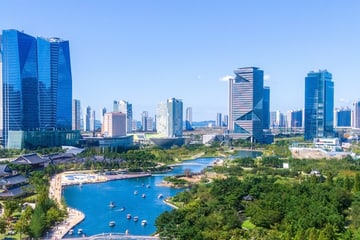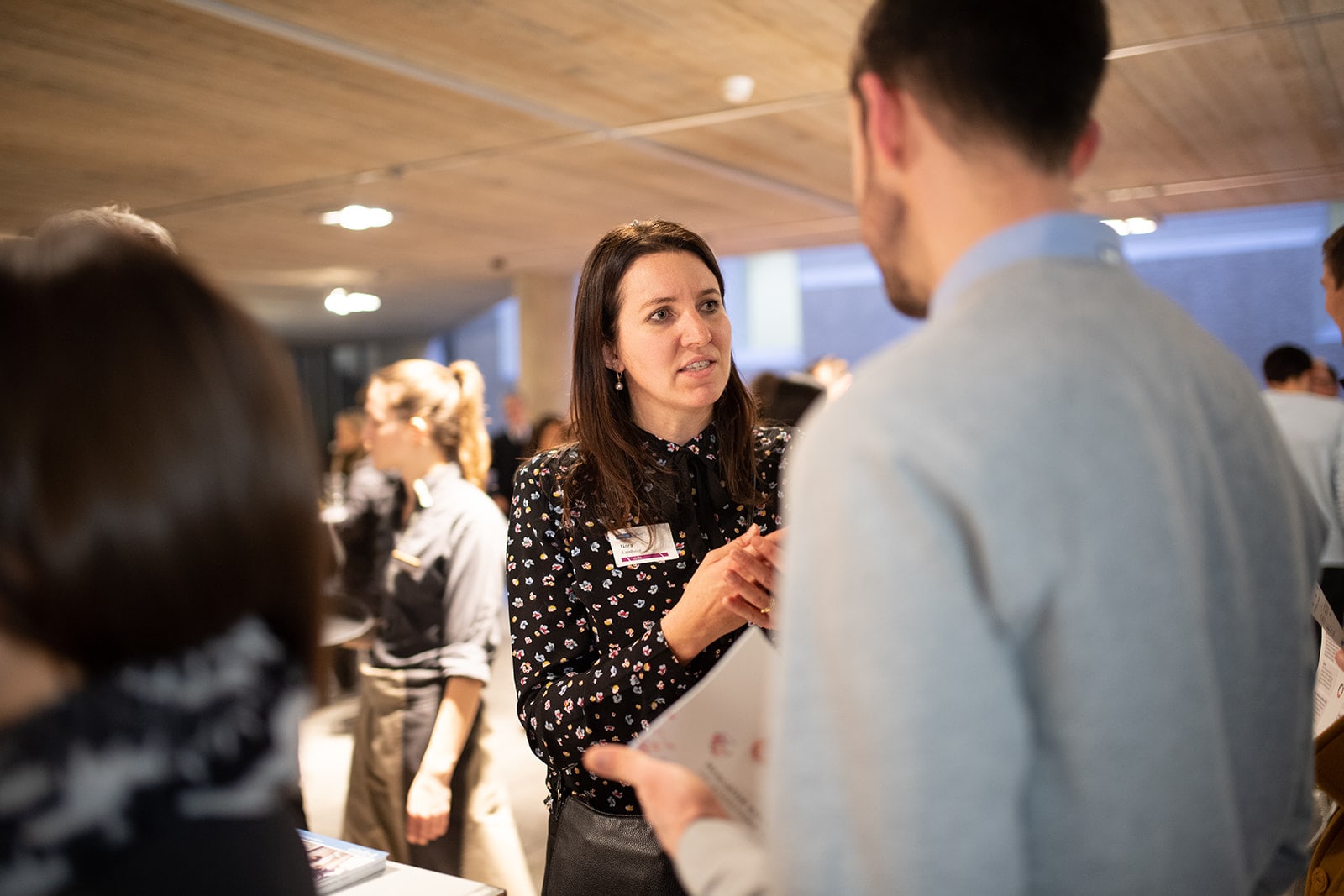From Switzerland to South Korea: Working at the Heart of Climate Action
The Green Climate Fund (GCF) is the largest global fund dedicated to helping fight climate change. Swiss national Tennessee Chappuis, Talent Acquisition and Onboarding Officer at GCF, tells us about his role and life in South Korea, gives advice on applying for a job, and gives insight into GCF’s recruitment process.


About Tennessee Chappuis
- Born: 1990
- Current position: Talent Acquisition & Onboarding Officer in the Office of Human Resources (OHR) with the Green Climate Fund (GCF) (Since May 2021)
- Tennessee Chappuis on LinkedIn
Before joining GCF, you worked in Switzerland in various positions. Can you tell us a bit more about how your career path led you to GCF?
Before GCF, I worked as an HR Representative for the international organization IUCN (International Union for Conservation of Nature) in Gland, Switzerland. I heard about GCF through ICUN and have been fascinated by South Korea and Asia since I was young. So, I kept looking at the open positions at GCF.
It took me at least two years to get a job here. GCF is a growing organization that quickly changes, so new opportunities are constantly arising. To enter GCF, you must persevere, continually check for new opportunities, and keep applying. Initially, I applied for a consultancy position (Recruitment and Onboarding Coordinator) in the Office of Human Resources (OHR) as no staff position was available then. This role interested me because it focused on recruiting, onboarding, and supporting staff members, whereas in my previous position, the scope of my responsibilities was much broader and less specialized.
Currently you are working as Talent Acquisition and Onboarding Officer. Could you tell us more about your work? What do you like most about your current position?
When I start my working day, I check my emails and answer staff members' questions about relocation or how to access certain benefits to which they are entitled. I lead the recruitment process for corporate functions and participate in panel interviews. I also take care of the whole onboarding process for new joiners. In addition, I use Asana as my daily task management system, which ensures that I don’t forget any of the steps in each recruitment process, which can easily happen if you don’t have an excellent tool to remind you. Finally, I also monitor the procurement side for the Talent Acquisition Team.
What is excellent about GCF is that we always try to look at how we can improve the way we work. We think outside the box and are free to propose process changes. This is motivating and a nice challenge because it helps us see how to constantly improve our recruitment and onboarding processes. Working for GCF is great because it can be approved relatively quickly if you want to make a change that makes sense as a business need and shows a real improvement. This is one of the reasons why I enjoy my job, as we have a lot of flexibility.
Working for GCF is great because it can be approved relatively quickly if you want to make a change that makes sense as a business need and shows a real improvement.
What do you like about living in South Korea?
Coming from Switzerland, there are a lot of things I appreciate. Switzerland is a great country to live in, and I’m always happy to return once a year. GCF allows you to visit your home country every year (Home Country Travel) and provide an allowance to cover your flight cost and expenses. Switzerland is quiet, and things don’t change quickly or very often. South Korea is very different, and it’s actually the opposite – things change constantly, just like at GCF. It’s good to be in this environment of constant change, allowing you to adapt to GCF and the South Korean lifestyle. Korean society aims to make everyone as comfortable as possible, which makes life quite convenient; if you need or want something, you can get it quickly.
South Koreans are also very open to foreigners; although they don’t necessarily all speak English, they understand quite well and enjoy interacting with foreigners. Right now, in South Korea, four point four percent of the population are foreigners; from that, fifty-four percent are Chinese, so there are very few Westerners, Africans, Americans, South Americans, or even Southeast Asians. The Korean Society puts more and more efforts to make it easier for foreigners by providing English-speaking hospitals or services and signs on public transport that are also written in English. It does not affect me much as I speak Korean quite fluently, therefore, I am well-integrated into the country. I studied Korean in South Korea 10 years ago, which was one of the reasons I came here; I also wanted to keep and improve my Korean skills. I feel settled here; South Korea now feels like my second home.
What makes working at GCF attractive for employees?
People are becoming more aware of climate change and want to do something about it and be part of the work to change it – GCF is at the heart of that. If you look at the project cycle, there are a lot of profiles coming from different backgrounds. We look for profiles in HR, Legal, Finance, Risk and Compliance, General Services, IT, and Audit for the corporate side. For the Programming side, we usually look for Monitoring and Evaluation, Project Management, Climate Investment, Economists profiles etc. The main difference would be our culture. We put forward the five GCF values: committed to climate action, innovative, respectful, responsive, and trusted. We want to ensure that people know them and that they are embedded in their work at GCF because that is what we stand and strive for. You don’t just come to GCF for the benefits but also for what you can contribute to GCF’s mandate.
We also want to become more of a career organiszation. We want to ensure people grow and foster knowledge within GCF. With our new Executive Director on board, we are moving towards that goal, which people are excited about.
Who would you say is suited for a career in multilateral organiszations?
GCF doesn’t just recruit people with a background in an international organiszation. However, it is always considered an advantage because it means that a person understands the sensitivities of working in this context. We are working together towards the same goal rather than competing with each other like in the private sector. Working in a multilateral organiszation requires people to focus more on what the mandate and team need than their personal goals. Cultural sensitivity is also significant, as we have close to 80 nationalities working at GCF, so most teams are very diverse.
Working in a multilateral organiszation requires people to focus more on what the mandate and team need than their personal goals.
What advice would you give to people interested in working for GCF?
At GCF, we hire eighty percent of our staff outside South Korea. We look for various backgrounds with different regional and international experiences. To get hired at GCF, you must be persistent, keep looking for new opportunities, and apply repeatedly, ensuring you have the minimum requirements for the job. Try to learn from each application – improve at every step, from the CV to the panel interview stage. It is possible to be successful if you keep applying as we often recruit for the same roles several times a year, and if we have looked at your application once, we are likely to look at it again and see how you have developed in the meantime.
What does the recruitment process at GCF look like?
You can apply for as many positions as you like – the important thing is ensuring you meet the minimal requirements. You won't get through the application process if you don’t meet the minimal requirements for the position. Secondly, make sure that the job description matches your background and experience, and tailor your CV and cover letter to the job description. We first do a technical assessment through an online video interview (self-recorded) for most positions. We ask around five to six questions to ensure you have minimal technical requirements and understand the role. If you apply for a communication, legal, or policy-related job, you will most likely have a written test to complete.
When preparing for a panel interview, look at the job description and see the required tasks – I usually tell candidates to look at what is required for this job and ensure that they have an example for every task in the job description. Having a proper example where you can explain what you did, what you learned, and how you managed to solve the problem is precisely what we are looking for. In the panel interview, we often ask the candidates to prepare a presentation, so presenting well and putting effort into the presentation will make an excellent impression. Preparation and time management during the presentation are also critical to success. The panel interview is usually competency-based, so we want you to provide concrete examples of your contribution to your team’s work. The last part of the recruitment process is a more informal one-on-one interview with two or three colleagues to assess your communication skills, fit with GCF, motivation, and any outstanding questions we may have for you. We do a psychometric test for international staff (IS) positions, but it’s not a deciding factor; it’s just to understand how you work and what kind of person you are to make it easier for the hiring manager to understand with whom they’ll be working.
We try to reduce the time it takes to recruit, but sometimes, getting back to the candidates can take weeks or months as we only reach out to unsuccessful candidates towards the end of the recruitment process. Nevertheless, at the end of the process, we ensure that candidates receive communication about their application.



